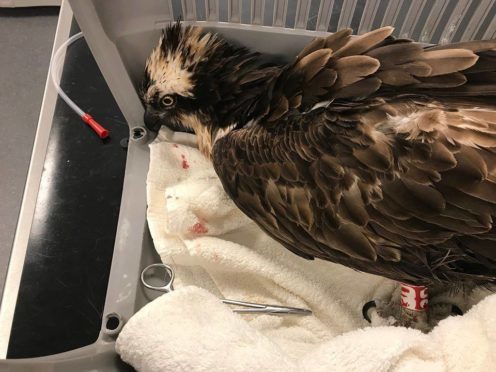A north-east animal rescue centre has been quarantined after an osprey showed potential signs of a deadly avian condition.
The injured bird was taken into care at New Arc near Ellon after flying into the grounds with fishing line wrapped around its neck and wing.
Vets had to remove the end of the line from the bird’s throat, and it is now recovering at the centre.
But the osprey is showing similar symptoms to Newcastle disease – a virus that can kill of poultry.
Staff announced last night that they had closed the sanctuary to new animals, and would not be releasing any into the wild, until tests are carried out.
Owner Keith Marley said there is a “remote chance” that Olly, as the osprey is now known, has it.
Mr Marley said: “He was tangled in fishing line and since then has been exhibiting symptoms of a neurological problem.
“It has a similarity to a disease called viral encephalitis, which is commonly known in chickens as Newcastle disease.
“There’s a very remote chance that an osprey can catch that, but we told that until a vet comes in and does tests we are in shutdown.
“It is a precautionary measure and it is something we to accept and go along with.
“The vets should arrive soon and hopefully this will get cleared up fairly quickly.”
New Arc were ordered to stop taking in new animals by the Animal and Plant Health Agency.
A vet used a camera to remove the fishing wire from the osprey’s throat and take out the hook from its body.
And thanks to British Trust of Ornithology ringers, Mr Marley has been able to chart its history.
He said the bird has been caught up in wires before.
Mr Marley said: “He is 17-years-old, he was ringed fairly locally and he went to Spain where he was trapped again.
“He showed signs at that of damage from electricity cables, so this guy has a bit of a history.
“For the last nine years he has been raising chicks successfully.
“We know where his nest is and that raised one chick this year which has now fledged.
“The osprey still faces a lengthy trip to South Africa and even if he fully recovered we might still have to keep him here for the winter.”
